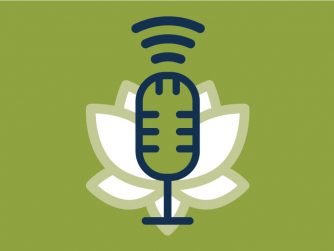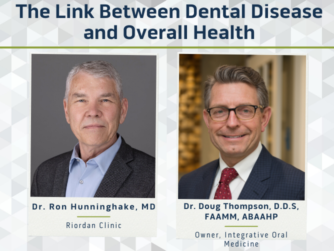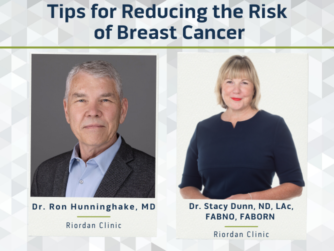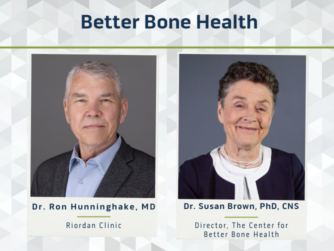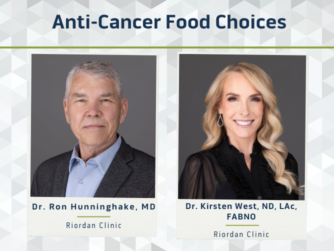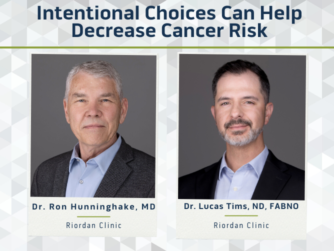In this episode, Leah Chischilly talks with Laura Vasquez, MSN, APRN, NP-C, who is a nurse practitioner specializing in integrative oncology and complex chronic illness. Laura is the newest member of the Riordan Clinic medical team and is a wealth of knowledge of both traditional and integrative medicine.
Learn about some of the ways Laura encourages patients to stay healthy and her own practices for a healthy, happy life. Laura is currently accepting new patients at Riordan Clinic Overland Park Location. To request an appointment with Laura, please visit: https://riordanclinic.org/request-an-appointment/
Thank You to This Episode’s Sponsor
Episode Transcripts
Disclaimer: The information contained on the Real Health Podcast. And the resources mentioned are for educational purposes only. They are not intended as, and shall not be understood or construed as medical or health advice. The information contained on this podcast is not a substitute for medical or health advice from a professional who is aware of the facts and circumstances of your individual situation. Information provided by hosts and guests on the Real Health Podcast or the use of any products or services mentioned does not create a practitioner patient relationship between you and any persons affiliated with this podcast.
Intro: This is the Real Health Podcast brought to you by Riordan Clinic. Our mission is to bring you the latest information and top experts in functional and integrative medicine to help you make informed decisions on your path to real health.
Leah Chischilly: Welcome everybody to the Real Health Podcast. I’m your host today Leah Chischilly and joining me from Overland Park is the newest member of the Riordan Clinic team. Her name is Laura Vasquez and she is our nurse practitioner. And we’re going to get to know all about her today. So Laura, thank you so much for joining me today.
Laura Vasquez: Thank you for having me Leah. I appreciate it.
Leah Chischilly: Yeah, we’re so happy to get this chance to talk to you and be able to introduce you to the audience here because you have such wonderful experience and so much knowledge that you’re bringing to Riordan Clinic and to everyone you work with. And we’re just really lucky to have you here. So let’s start, I want to know just a little bit about your background. First and foremost, How did you get into medicine? Was it something, was it a path that you had always pursued?
Laura Vasquez: I actually became interested in medicine from a very young age. My mom actually was a registered nurse for over 40 years. So I used to go to the hospital and visit her. She would tell me stories. I just grew up in that culture. And then probably I was, I want to say about three or four, I used to take her medical encyclopedia out from under her bed and point to pictures and I would want her to, you know, explain what was going on with that disease. And so she would read me the descriptions and we would talk about it. And so I was very lucky to always know that, you know, the human body disease processes and medicine in general, I didn’t know what aspect I wanted to practice or do, but I knew that was definitely going to be the career field that I, that I was going to choose.
Leah Chischilly: Yeah. That’s so cool. And so nice to know at a young age. So, and now what was your trajectory from there? Was it right after high school, you went and pursued nursing or how did that go?
Laura Vasquez: I actually have a bachelor’s in psychology and a minor in child and family development. That was my first undergraduate degree. I didn’t work in healthcare when I was growing up in any capacity, but I wanted to go to nursing school and my path kind of changed and I was really interested in psychology and psychiatric medicine. And so I have always been very fascinated with the mind body connection and understanding that more. And so I took that route and then after I graduated a couple years later, I did an accelerated bachelor’s of nursing because I really knew that I wanted to be a nurse. And so I combined both of them. Ultimately going through my bachelor’s in psychology and nursing, my ultimate goal is always to be a nurse practitioner, whether it was mental health nursing, or obviously I’ve been into integrative medicine for a long time just studying on my own. I’m very fascinated with more of the Eastern modalities. And so yeah, as a nurse practitioner is where I ended up eventually, you know, getting my masters and becoming a nurse practitioner.
Leah Chischilly: Yeah. That’s such an amazing background because there is such a huge connection between the mind and the body. And I think having a really deep understanding of that is so beneficial.
Laura Vasquez: Absolutely.
Leah Chischilly: So, what was your path to integrative medicine? You said that you kind of started studying on your own was there an event or anything or was it just something had sparked your interest in it?
Laura Vasquez: I have gone to a chiropractor since I was a little girl. And so he was always discussing herbal supplements, vitamins nutrients. And so I took an interest in that as a young girl as well. And then I actually saw an acupuncturist when I was, I want to say a teenager for a lot of sinusitis, sinus issues that I’ve had since I was young. And I was so fascinated with acupuncture. I started really learning about different Eastern modalities, herbal therapies, acupuncture, just really studying on my own. And I actually, at that point I was, I was going into Missouri state to get my degree in psychology. I really wanted to pursue a more integrative health route. However, I just chose to kind of go the traditional route. And I knew one day I was hopeful that I could come back and study more of the integrated therapies and incorporate those with, you know, my conventional training. So it just kind of all came together.
Leah Chischilly: It’s fun when that finally works out. Right. We don’t see it when we’re in it. And then somehow it kind of works its way back around and it all comes together. So how would you say they complement one another? How’s your background in Western medicine served you as much as your background in integrative medicine?
Laura Vasquez: So, you know, I’ve had a background in more conventional medicine for the last 11 years and, you know, in this society we live in, that’s very important to know, you know, the standard ice care protocols and to have that experience with the hospital system and our standard form of, of medicine here in the United States. And so being able to now study and incorporate more functional medicine, testing and treatments, more natural treatments that are evidence-based, it is so profound, the outcomes for patients I have seen when you get to combine both of those in the right way, because I think both have benefits.
Leah Chischilly: Yeah, I definitely agree. And I feel like there’s so much benefit to the patient when they have someone who has the understanding of both and when they have a team. And I think that’s something that we really offer at Riordan Clinic, you know, not, not to plug it, but you know, that’s one thing that we really pride ourselves on is the fact that we have a team. We have a team of MDs, ND’s, nurse practitioner and physician’s assistant who have the conventional medicine background, but also the integrative and the more holistic and natural. And we’re able to combine all those together and really serve our patients on a much deeper level.
Laura Vasquez: Yes, that is exactly right. That’s exactly how I would have phrased it.
Leah Chischilly: So tell me a little bit about your role, what it’s going to be at Riordan Clinic. So you’re at our Overland park office in Overland Park, Kansas. Tell us a little bit about what your role is there.
Laura Vasquez: So my primary focus will be on integrative oncology working alongside Dr. Lucas Tims. We provide an integrative approach in addition to standardized treatments, the standardized model often focuses on the tumor and attempts to eradicate it. What we do here is dive deeper to investigate why you have this disease see manifesting in your body. We will perform in depth lab analysis, looking for elevated levels of environmental toxins, such as plastics, pesticides, molds, heavy metals. We also analyze your nutrient status. Look at mitochondrial health among lots of other things such as immune function, drivers of inflammation. And our ultimate goal is to determine, you know, why you develop this cancer and target evidence-based natural therapies to support your immune system, reduce oxidative stress. We offer several different natural treatments such as ozone therapy to really treat any underlying viruses, bacteria, anything that could be causing this inflammation or depression of your immune system. That’s really what we do here. And it’s in conjunction, like I said, with standardized treatments. So we offer the patient the best hope of, you know, improving quality of life while they’re living with cancer, prolonging life, helping to really target the underlying causes and help them heal in a way that sometimes standardized treatments aren’t able to do.
Advertisement: There’s a lot more to this conversation and it’s coming up right after a quick break.
Today’s episode of the Real Health Podcast is brought to you by the Riordan Clinic nutrient store. The nutrient store is your resource for the highest quality nutritional supplements. Every supplement in the store is handpicked by the expert medical staff at Riordan Clinic, providing you with the best quality purity, consistency and effective dosing available visit store.Riordan clinic.org to shop online.
Leah Chischilly: I’m so curious. Now, you, you talked about a lot of things in a lot of different contributors to cancer that you see. Is there anything that you see is a commonality amongst the patients like something that really stands out?
Laura Vasquez: Yes, it’s a great question. Since I have been at the clinic shadowing with Dr. Lucas, we do find a lot of environmental toxins in our patients see plastics. Organophosphates we see glyphosate levels that are high. So a lot of these chemicals have been shown to be carcinogenic. And when you combine, you know, a patient who has these chemicals in their blood or in their body where they’re not supposed to, with other factors such as poor diet, or, you know, other lifestyle factors or insults to the body, you know, they’ve been developing inflammation for a long time when you can kind of find those things, you know, you’re onto something. And so we do work to detoxify them optimize their nutrients. You know, obviously we use IVC. We’re known for that here to help with the oxidative stress.
Leah Chischilly: No, that’s really great. And I think a lot of people, we just don’t necessarily think about the environmental aspect. What are some things that people can do to avoid those environmental toxins? Or, you know, if, if they’re unavoidable, if there’s something that’s, we’re going to get into, no matter what, are there some things that they can do at home to help with the detoxification process or to help prevent some of this stuff?
Laura Vasquez: Yes. So I would say number one, it always goes back to food. So looking for non GMO products, obviously avoiding heavily processed foods, you know, we all know that those are bad, but they’re so prevalent in our lifestyle today. So aiming for organic produce that you can really get a lot of those phytonutrients and clean drinking water, you know, being able to get something like a home system. There’s a lot of good ones out there. What else I would say, optimizing your nutrient status, you know, coming in and checking your nutrients to see, are you deficient in B vitamins? How are glutathione levels, which is our natural antioxidant. So doing that, that upfront testing and then targeting those supplements is going to help your body detoxify better. So food, water, detoxification, sleep and exercise. So, you know, moving your lymphatic system. Sweating is huge so that you can continue to help your body detoxify naturally.
Leah Chischilly: Yeah, those are some great tips and really like to highlight, you know, these are things that a lot of people can do for free and it’s just getting back to basics. So instead of being afraid that you have to spend a ton of money or do a lot of things all at once, it’s like start small work on the basics, get better at that. Would you agree?
Laura Vasquez: Yes, that’s what I often tell the patients because it can be overwhelming when you’re trying to make a lot of changes at once. It can, it can cost money. It takes a lot of energy to figure all of this out. So pick one, you know, if you feel like your diets where you need a huge improvement, start there with the diet and then get the, you know, make sure you’re having clean filtered water. So just do one at a time. And if you make those small changes, you’re gonna go a long way for prevention in the long run or to help healing, whatever dysfunction is going on in your body at that time.
Leah Chischilly: That’s such great advice. Awesome. So tell me some of the things that you do to help maintain your own health throughout, just on a day to day, maybe some of your daily habits, or maybe some of the other things that you’re into that help you stay healthy and happy.
Laura Vasquez: So I have been using supplements for years and I continue to find new supplements. And so just really keeping up my nutritional status through supplementation, cause it’s really hard for your diet to get everything you need in a day or a week. And I also, I’ve been huge advocate of, and just a lifelong learner about nutritional therapy. So just in general, I love cooking and trying new recipes with different spices utilizing different vegetables that, you know, maybe I’m not commonly eating. So I think diet just supplementing and really finding ways to destress. Exercise is huge for me as it is for a lot of people. So I like to do a combination of high intensity a couple of days a week, get out on a bike ride with my family. We do, I do yoga. So just doing a variety of exercises, weightlifting and, you know, keeping it fun, laughing, sleeping well doing all those things that really go a long way to keep you healthy and sustain, you know, your longevity.
Leah Chischilly: Yeah. That’s awesome. Well, you definitely walk your talk, which I think is a big benefit when you’re looking up for a provider, you have someone that does the things that they’re telling you to do. I think it feels very motivating.
Laura Vasquez: Thank you so much. Yes, that’s so true.
Leah Chischilly: So I do have one last question for you today because this is the Real Health Podcast. What does real health mean to you?
Laura Vasquez: I would say real health means attaining a state of constant balance in your mind, body and spirit. This process often begins with first awareness and intention on behalf of that person to engage in behaviors that are going to promote and nurture their wellbeing. We often say here at the Riordan Clinic we’re co-learners with our patients because we are developing that relationship to help them make those changes and trust in us as a provider that we have their best interest at hand. I would also say just like we talked about consuming nutritious food without a lot of chemicals, practicing stress, stress reduction techniques you know, to counterbalance the stressors in our environment that we are constantly inundated with. So, there’s so many things you can do to really promote real health in your life. It just takes kind of that first step of awareness and then taking the steps to go down that path.
Leah Chischilly: I love that. Awesome. Well, thank you so much for joining me today, Laura, I want to highlight that Laura is accepting new patients at our Overland Park office, and you can find all the information at riordanclinic.org and Laura, again, just thank you for taking the time we are so lucky to have you here sharing all of your knowledge and taking such great care of our patients.
Laura Vasquez: Thank you. We look forward to talking to you soon.
Leah Chischilly: Sounds good. Take care.
Outro: Thank you for listening to the Real Health Podcast. If you enjoyed this episode, be sure to subscribe and leave us a review. You can also find all of the episodes and show notes over at realhealthpodcast.org. Also, be sure to visit Riordanclinic.org, where you will find hundreds of videos and articles to help you create your own version of real health.


